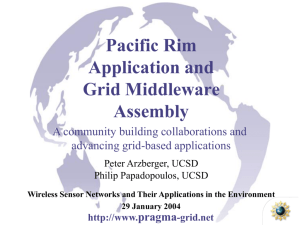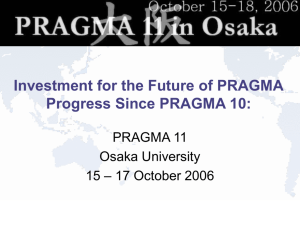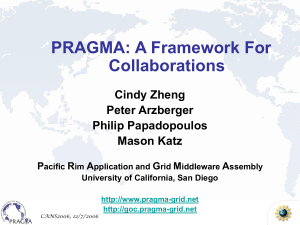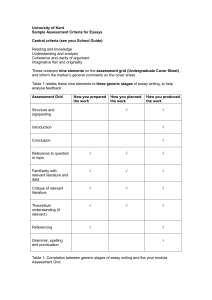Examples of Team Science and Global Engagement
advertisement
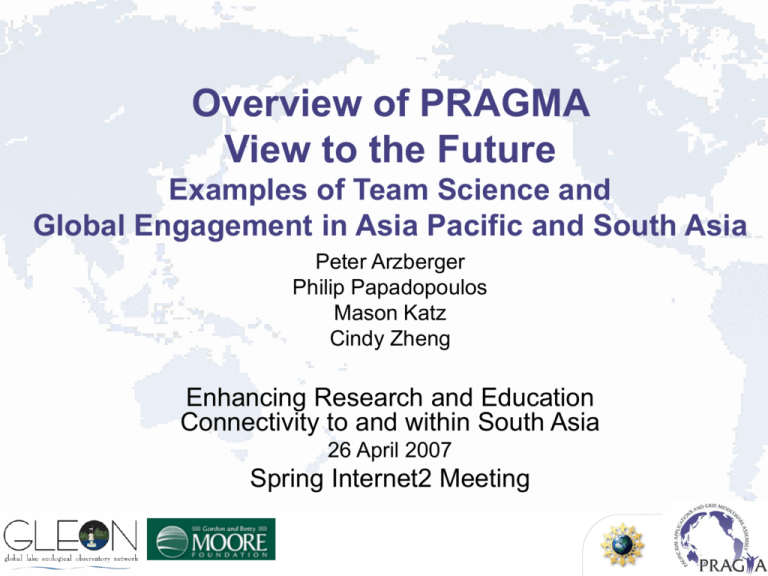
Overview of PRAGMA View to the Future Examples of Team Science and Global Engagement in Asia Pacific and South Asia Peter Arzberger Philip Papadopoulos Mason Katz Cindy Zheng Enhancing Research and Education Connectivity to and within South Asia 26 April 2007 Spring Internet2 Meeting Some Perspectives: Do they apply to you? • “…The conduct of science, Spread of Infectious Diseases intrinsically global, has become Health of Oceans increasingly important to Health of Coral Reefs addressing critical global Impacts of Global Warming issues… .” [NSB 2000] Role of Lakes in Carbon Cycling • “ It is imperative that the ACP [Advanced Cyberinfrastructure Avoid Replay of Cluster Divergence Program] interoperate with Grids Support Global Science cyberinfrastructure being developed and deployed in other Tools Developed Across Globe countries.” [Atkins et.al. 2003 ] • “What nations don’t know can hurt them. The stakes involved in study abroad are that simple, that People Make Collaborations straightforward, and that important. … college graduates today must be internationally competent.” Delivered by Philip Papadopoulos, [Lincoln Report 2005] NSF Global Engagement Workshop e-science’s Team Science: Merging of Science and Information Technology Education & Capacity Building Sustained Collaboration • Build teams and trust • Many meetings Science Drivers Previously Unobtainable Observations and Understanding • Develop human resources • Students and postdocs Enabling Technology • Advance science • Focus development Persistent • Stream Data • Source, movement, Infrastructure • Dist. Files System fate of carbon in lakes • Web Services • Role of Savannah Burns • Broaden impact • Cross-site query • Software, data on Monsoons • Collaborative Tools • Active sites of infectious • Lambda Grids • Wireless sensor network • Many more agents PRAGMA Overarching Goals Strengthen Existing and Establish New Collaborations Work with Science Teams to Advance Grid Technologies and Improve the Underlying Infrastructure In the Pacific Rim and Globally “A Practical Collaborative Framework”. http://www.pragma-grid.net Overview and Approach Process to Promote Routine Use Team Science Workshops and Organization Application-Driven Collaborations Applications Middleware Information Exchange Planning and Review Routine Use Lab/Testbed Testing Applications Building Grid and GOC New Collaborations New Members Expand Users Expand Impact Multiway Dissemination Key Middleware Outcomes Improved middleware Broader Use New Collaborations Transfer Tech. Standards Publications New Knowledge Data Access Education Applications and Middleware http://goc.pragma-grid.net/applications/default.html • • • Real science applications pair and drive middleware development Achieve long-run and scientific results Open to applications of all scientific disciplines – Climate simulation • Savannah/Nimrod (MU, Australia) • MM5/Mpich-Gx (CICESE, Mexico; KISTI, Korea) – Quantum-mechanics, quantum-chemistry: • TDDFT, QM-MD, FMO/Ninf-G (AIST, Japan) – Genomics • iGAP/Gfarm/CSF (UCSD, USA; AIST, Japan; JLU, China) • HPM: genomics (IOIT-HCM, Vietnam) • mpiBlast/Mpich-G2 (ASGC, Taiwan) – Organic chemistry • Gamess-APBS/Nimrod (UZurich, Switzerland) – Molecular simulation • Siesta/Nimrod (UZurich, Switzerland; MU, Australia) • Amber/Rsh ( USM, Malaysia) – Compute Science • Load Balancer (VAST-HCM, Vietnam) • GriddLeS (MU, Australia) Source: Cindy Zheng PRAGMA Grid Testbed CNIC CNIC GUCAS China UZurich Switzerland JLU China LZU China UoHyd India CUHK HongKong NECTEC NECTEC ThaiGrid ThaiGrid Thailand MIMOS USM Malaysia AIST AIST OsakaU UTsukuba TITech Japan KISTI Korea ASGC NCHC Taiwan IOIT-HCM Vietnam BII IHPC NGO NGO Singapore MU Australia UUtah USA NCSA USA SDSC USA UMC USA CICESE Mexico UNAM Mexico APAC QUT Australia BESTGrid New Zealand ASURC Costa Rica UCN Chile UChile Chile 32 Clusters from 29 institutions in 14 countries/regions (+ 7 in preparation) 7 gfarm sites Source Cindy Zheng BU USA Savannah Burn: How tightly linked are burning, vegetation, and rainfall? • PRAGMA Testbed ran CSIRO climate model called CCAM in combination with Nimrod/G tool set. • Executed on a maximum of 90 processors (out of a maximum 159) across 7 PRAGMA grid resources located in Australia, Japan, Korea, Taiwan, Thailand and the U.S. • David Abramson, Amanda Lynch Validation of Cyberinfrastructure Investments by the Savannah Burn experiment • Science Resulted: The hypothesis that burning the Savannah can affect the strength and timing of the monsoon was confirmed. Testbed Exercised: The testbed operated for 170 days, and delivered over 1.25 million processor hours! Importantly, we were able to do a live upgrade of a number of the cyberinfrastructure components during the period. Middleware Improved: Improved Nimrod's ability to schedule computations by incorporating both data location and transport delays. • • – – • Allowing it to make a better choice of resources, improving the performance of the system as well as its fault tolerance. We also enhanced Nimrod's ability to handle faults in the Grid testbed. Policy Impacted: The experiment shipped some 1.6TB of data across national and international networks. This exposed some interesting features of Australia’s network charging policy, and will lead to lasting improvements. Collaborations With Science and Technology Teams • Grid security – Naregi (Japan), APGrid, GAMA (SDSC, USA) • Grid infrastructure – Monitoring - SCMSWeb (ThaiGrid, Thailand) – Accounting - MOGAS (NTU Singapore) – Metascheduling - Community Scheduling Forum (JLU, China) – Cyber-environment - CSE-Online (UUtah, USA) – Rocks and middleware (SDSC, USA; …) • Ninf-G, SCE, Gfarm, Bio, K*Rocks, Condor, … • Datagrid, sensor, network – – – – Gfarm-fuse (AIST, Japan) GEON data network GLEON sensor network OptIPuter - High performance networked TDW, Telescience Source: Cindy Zheng Grid Interoperation Experiments http://goc.pragma-grid.net/wiki/index.php/Main_Page#Grid_Inter-operations • OGF – Grid Interoperation Now (GIN), GIN-OPS – GIN testbed (February, 2006 – on-going) – TDDFT/Ninf-G (PRAGMA - AIST, Japan) • PRAGMA, TeraGrid, OSG, NorduGrid; EGEE – Savanah fire simulation (PRAGMA - MU, Australia) • PRAGMA, TeraGrid, OSG – Multi-Grid monitoring • SCMSWeb probe matrix (PRAGMA - ThaiGrid, Thailand) • Common schema (PRAGMA, TeraGrid, EGEE, NorduGrid) • Peer-grid interoperation experiments – PRAGMA->TeraGrid (October, 2006 – on-going) • PRAGMA member runs application across both grids • QM/MD/Ninf-G (AIST, Japan) • Manual reservation, 7 sites in PRAGMA, 3 sites in TeraGrid – OSG<->PRAGMA (January, 2007 – on-going) • • • • • Members from both grids run applications across both grids OSG - Spatial Interpolation (UIowa, USA) PRAGMA - FMO/Ninf-G (AIST, Japan) OSG - FermilabGrid PRAGMA – SDSC, USA; NECTEC, Thailand; NGO, Singapore; ThaiGrid, Thailand Source: Cindy Zheng PRAGMA Highlights of 2006 - 2007 • Simulating the Australian Monsoon and the Effect of Wildfires • PRAGMA Biosciences Portal • PRAGMA Leads Application Experiment of Grid Interoperation in GIN Testbed • PRAGMA Establishes Certificate Authority (CA) Using Naregi-CA Software • Expanding the Collaboration Grid • Building Communities, Catalyzing Collaborations • PRIME and PRIUS • More accomplishments in the Working Group sections Collaborate in Publishing Research Results Some Publications 2006 • • • • • • • Arzberger P, Papadopoulos P. PRAGMA: Example of Grass-Roots Grid Promoting Collaborative EScience Teams. CTWatch. Vol 2, No. 1 Feb 2006. www.ctwatch.org/quarterly/articles/2006/02/pragmaexample-of-grass-roots-gridpromoting-collaborativee-science-teams Abramson D, Lynch A, Takemiya H, Tanimura Y, Date S, Nakamura H, Jeong K, Hwang S, Zhu J, Lu Z, Amoreira C, Baldridge K, Lee H, Wang C, Shih HL, Molina T, Li, W, Arzberger P. Deploying Scientific Applications on the PRAGMA Grid testbed: Ways, Means and Lessons. IEEE/CCGRID International Workshop on Grid Computing, 2006, Singapore. Lee B-S, Tang M, Zhang J, Soon O Y, Zheng C, Arzberger P. Analysis of Jobs on a Multi-Organizational Grid Testbed. IEEE/CCGRID Int’l Workshop on Grid Computing, 2006, Singapore. Zheng C, Abramson D, Arzberger P, Ayuub S, Enticott C, Garic S, Katz M, Kwak J, Lee B S, Papadopoulos P, Phatanapherom S, Sriprayoonsakul S, Tanaka Y, Tanimura Y, Tatebe O, Uthayopas P. The PRAGMA Testbed: Building a Multi-Application International Grid. 2005 IEEE/CCGRID International Workshop on Grid Computing, 2006, Singapore. Li WW, Arzberger PW, Yeo CL, Ang L, Tatebe O, Sekiguchi S, Jeong K, Wuang S, Date S, Kwak JH. Proteome Analysis Using iGAP in Gfarm. The Second International Life Science Grid Workshop 2005, Grid Asia 2005, Singapore 2005. Wei X, Ding Z, Li W W, Tatebe O, Jiang J, et al. GDIA: A Scalable Grid Infrastructure for Data Intensive Applications. IEEE Int’l Conference on Hybrid Information Technology, ICHIT 2006, Cheju Island, Korea. Krishnan S, Baldridge K K, Greenberg J. P, Stearn B, Bhatia K. An End-to-End Web Services-Based Infrastructure for Biomedical Applications. Proceedings of Grid 2005, 6th IEEE/ACM Int’l Workshop on Grid Computing, November 13-14, 2005, Seattle, WA, U.S. PRIME: Providing Students International Interdisciplinary Research Internships and Cultural Experiences preparing the global workplace of the 21st century PRIME Class 2006 •Computer Network Information Center (CNIC), Chinese Academy of Sciences •Cybermedia Center (CMC), Osaka University, Japan •Monash University, Australia •National Center for Highperformance Computing (NCHC), Taiwan • Built on top of PRAGMA people network – Dual Mentors; Pre/post research apprenticeship – Cultural competency preparation • What’s Up with Culture – Professional development seminars • A Pilot Project for Global Engagement prime.ucsd.edu Educational Network linking 13 organizations Fostering of Globally-Leading Researchers in 7 countries centered around the Pacific Rim in Integrated Science (PRIUS) Achievement 2006(2005): # of PRIUS-Invited lecturers # of Internship Students “Studies on International Integrated Science I, II” 13 (6) 4 (1) University of Illinois, Chicago Harbin Institute of Technology University of California, San Diego rsity of Zurich, Irchel National Center for High-performance Computing University of Malaysia Nanyang Technological University Queensland University of Technology QM/MM simulation Using OPAL OP Bioscience GridPortal University of Melbourne Invited Lecturer Security Monitoring System Based on MOGAS PRIUS URL: http://prius.ist.osaka-u.ac.jp Internship Student University of Canterbury Augment Reality toolkit Towards a Global Lake Ecological Access can be difficult during the most Observatory Network interesting times 20 18 Photo by Peter Arzberger, October 2004 16 20 18 16 14 12 10 8 6 14 4 2 12 22-Aug (mm per 5 minute interval) Surface 0.5 meters 1 meter 1.5 meters 2 meters 2.5 meters 3 meters Precipitation Precipitation Water Temperature (°C) 22 0 23-Aug 24-Aug 25-Aug 26-Aug 27-Aug 28-Aug Date Source: Tim Kratz Yuan Yang Lake, Taiwan ; photo by Matt Van de Bogert Collaboration in Environmental Science Global Lake Ecological Observatory Network • A grassroots network of – People: lake scientists, engineers, information technology experts – Institutions: universities, national laboratories, agencies – Programs: PRAGMA, AS-Forest Biogeochemistry,US-LTER, TERN, KING, EcoGrid, etc. – Instruments – Data • Linked by a common purpose and cyberinfrastructure • With a goal of understanding lake dynamics at local, regional, continental, and global scales GLEON People & Groups TEAM SCIENCE 15 MEETINGS San Diego March 05 Townsville March 06 Hsinchu October 06 Lammi March 07 Montreal August 07 GLEON Existing sites = yellow New sites (RCN) = red Research Coordination Network (NSF award, PI: P Hanson): • Includes a series of key science questions • Architectural design of coordinated global sensor network • Broaden involvement at all levels; new partners, outreach and education Lessons Learned in Building e-Communities • Repeated structured interactions (workshops) to build the community – More often at first, twice/year now – Unstructured/Spontaneous interactions. It was several years before these started • Group focuses on enabling science outcomes • Technology builders give tutorials on capabilities • Science + Technologists work side-by-side – Infrastructure/Requirements evolves naturally – Not “Build it and they will come” – Not “Gather requirements, Get stakeholder Buy In” • Culture of openness and sharing of know-how and software • Continue to experiment: Applications, Technologies, Meetings (structure, types), People (and students) • Baby steps; and more baby steps (Learn by doing) • Break bread together • Stay PRAGMAtic Every Presentation Is an Invitation to Collaboration: Some Ideas • Involvement in PRAGMA Grid or other activities – – – – Biosciences - Avian Flu; Metagenomics Geosciences GLEON (or CREON) Telesciences and Tile Display Walls – NEEDS NETWORKING • PRAGMA Institute for South Asia – NCHC (Taiwan) has annual workshop for Southeast Asia – U of Hyderabad is willing to host a PRAGMA Institute for this region! • Exchange students and researchers – PRIME / PRIUS • Participation in PRAGMA Workshops – Two times per year Future PRAGMA Workshops • 20 – 22 March 2007, Bangkok Thailand – PRAGMA 12 Hosted by NECTEC and Thai National Grid Center, – 20 March 2007: GEOGrid Workshop • 23 – 25 September 2007, UrbanaChampaign Illinois USA – PRAGMA 13 Hosted by NCSA • Spring 2008, Hsinchu Taiwan – PRAGMA 14 Hosted by NCHC • Fall 2008, Penang Malaysia – PRAGMA 15 Hosted by USM www.pragma-grid.net But Why Get Involved? • Larger Reasons – Science is global and collaborative – Internet and grid designed globally • Personal or Institutional – – – – – – Exposure to technologies and developers Obtain users of software Gain access to resources Develop collaborators and contacts Expose students/staff to new conduct of science Launch new programs • Other – Force improvements in infrastructure Network Challenges: How common are these? • 1. Accessibility (easier in metro city) • 2. Cost of the Bandwidth (very high) • 3. Bound on latency (to be decreased) currently to USA it is < 330msecs. • 4. Bilateral/multilateral agreements Global Engagement Examples and Programs SCIENCE • GLEON – Global Ecological Observatory Network – Grassroots effort to understand lake dynamics EDUCATION • PRIME – Pacific Rim Experiences for Undergraduates – Prepares globally-enabled workforce • PRIUS – Pacific Rim International UniverSity at Osaka University – Prepares global workforce in context of curriculum GRID • PRAGMA – Pacific Rim Application and Grid Middleware Assembly – Catalyzes collaborations SOFTWARE • OptIPuter: – Optical networking, Internet Protocol, computer storage, processing and visualization technologies – Develops technologies for data intensive computing and collaborations • Acknowledgements All PRAGMA members – Slides from Phil Papadopoulos, Cindy Zheng, FangPang Lin, Satoshi Sekiguchi • • • • • • • • • • • • • • Gabriele Wienhausen, UCSD - PRIME Susumu Date and Shinji Shimojo, Osaka University – PRIUS Tim Kratz, U Wisconsin; Fang-Pang Lin, NCHC, David Hamilton, U Waikato – GLEON Larry Smarr – OptIPuter Wilfred Li – National Biomedical Computation Resource Tony Fountain, Tim Kratz, Ken Chiu, Rick McMullen, Sameer Tilak Autoscaling Bill Chang, NSF for planting the seed and ongoing encouragement NSF, Gordon and Betty Moore Foundation, TATRC, NIH PRAGMA is supported by the NSF (Grant No. INT-0216895, INT-0314015, OCI 0627026), the San Diego Supercomputer Center, and the California Institute of Telecommuncations and Information Technology , The University of California, San Diego and member institutions PRIME is Supported by the National Science Foundation under NSF INT 04007508 AutoScaling, NEON 0446802 The OptIPuter receives major funding from the National Science Foundation, cooperative agreement ANI-0225642 to UCSD TATRC – for funding of avian flu international collaboration NBCR – for biomedical infrastructure, funded by NIH A Final Thought • “Peace and prosperity around the world depend on increasing the capacity of people to think and work on a global and intercultural basis. As technology opens borders, educational and professional exchange opens minds.”[i] http://www.youtube.com/watch?v=4lY6x0S3IoA Google: PRIME students youtube [i] Annual Report IIE 2005, and http://www.iie.org/ “About”
